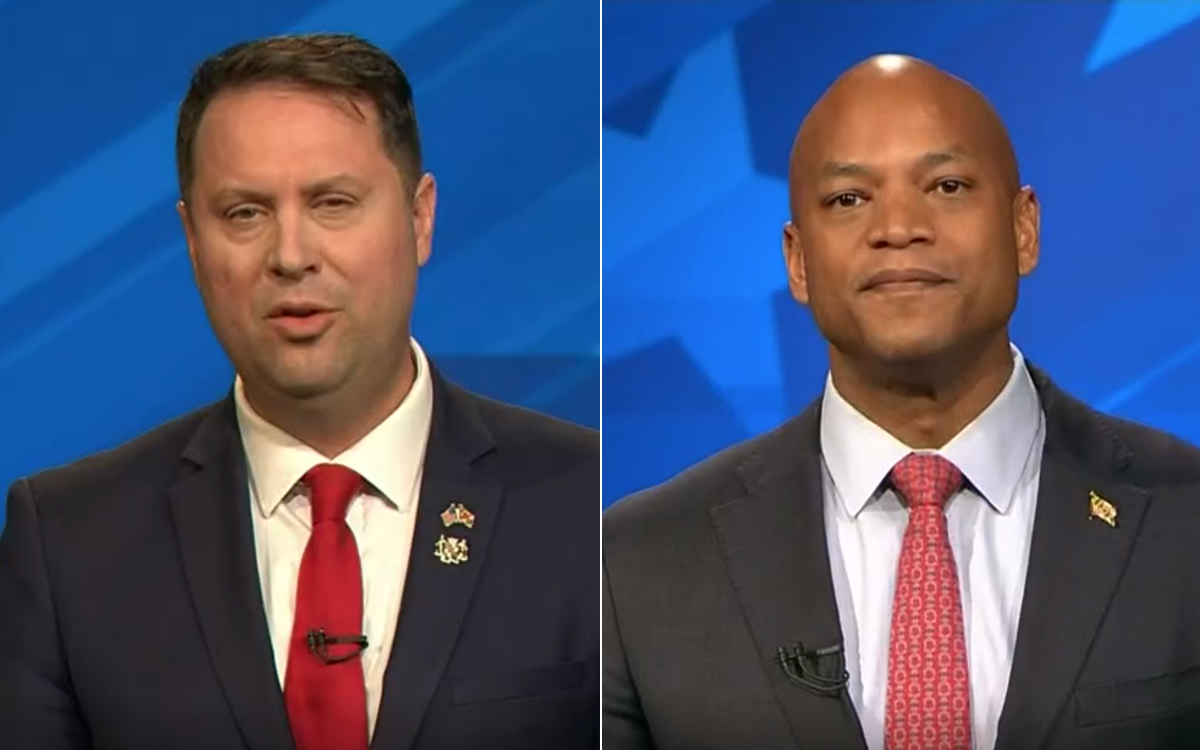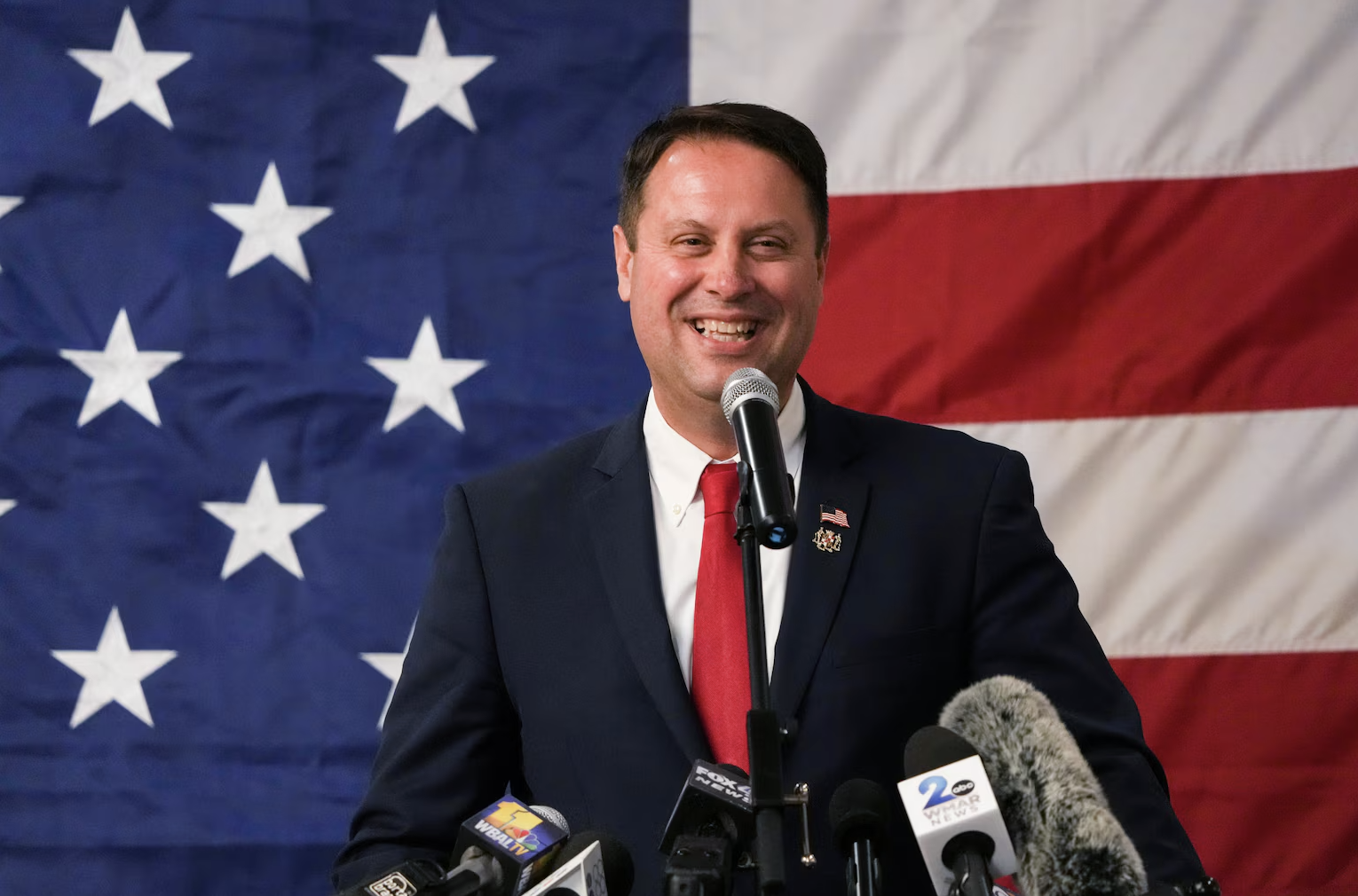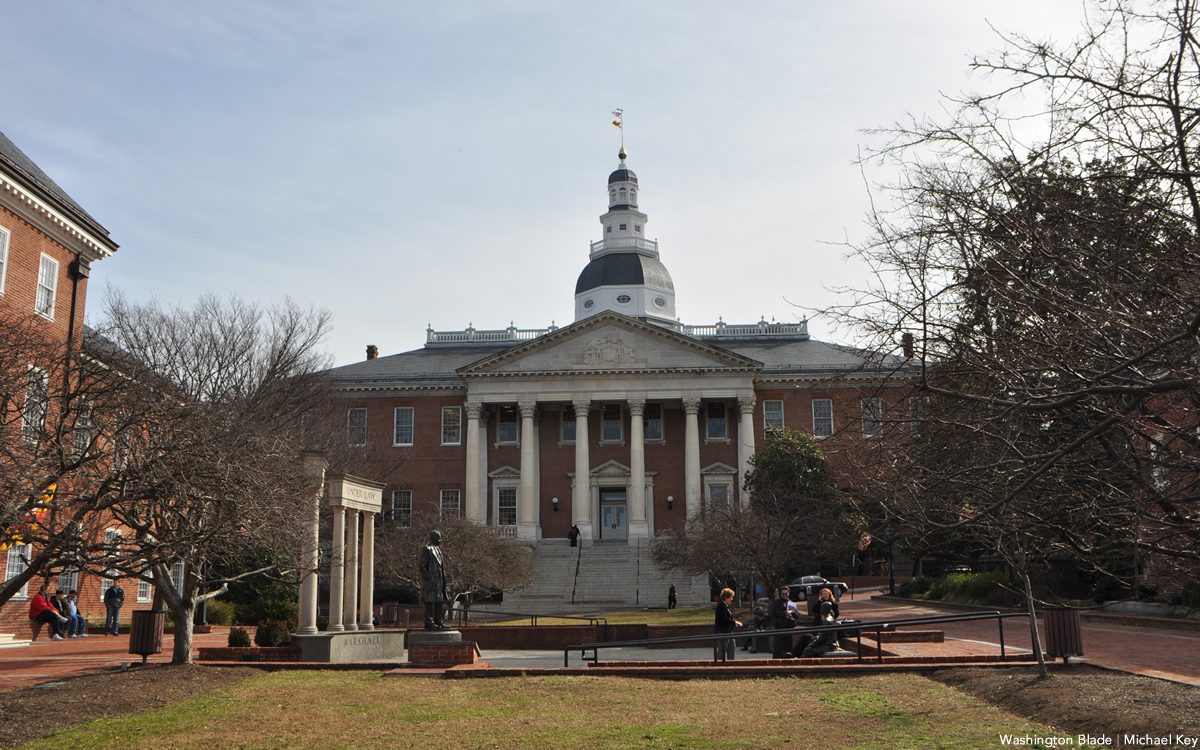Maryland
Md. statewide candidates make final pitches ahead of Election Day
Wes Moore said he will make state ‘inclusive’ as governor

Candidates in races for statewide offices in Maryland are making their final pitches to voters ahead of next week’s highly anticipated midterm elections.
Approaching Election Day, each of the three races for governor, attorney general and comptroller have offered their own dichotomies between candidates on the ballot.
Governor
Maryland’s gubernatorial race has pitted Democratic former CEO and U.S. Army veteran Wes Moore against state Del. Dan Cox (R-Frederick County). The seat is seen as one of the most likely Democratic gubernatorial pickups in what is expected to be a difficult year for the party to maintain its majorities in Washington.
As part of his campaign, Moore has sought to draw stark contrast from his opponent when it comes to matters involving LGBTQ rights and diversity.
“So, we are going to make sure that Maryland is going to be an inclusive state, a state where people feel welcome and a state where we’re asking people to be comfortable with who they are,” Moore said in an Oct. 17 interview with the Washington Blade. “And to know that you’re going to have a state that ultimately enforces it.”
In the state legislature, Cox has endorsed efforts to restrict LGBTQ rights and topics in the state’s education system, referring to such as “classroom indoctrination.”
The latest polling in the race has shown Moore leading Cox by more than 30 points in a seat currently held by popular Republican Governor Larry Hogan.
“And people are saying, ‘Why are you going [to conservative areas] if there are not a lot of Democrats out there?’ My answer is simple: It’s because there’s a lot of Marylanders, and I’m planning on being their governor too,” Moore told the Blade. “You know, when I was in the Army and leading soldiers into combat, one question I never wanted to ask my soldiers is, ‘What’s your political party?’ It didn’t matter. We had one goal and one job and one mission.”
Attorney general
Vying for the state attorney general’s office, Democratic Congressman Anthony Brown and former Republican Anne Arundel County Councilman Michael Peroutka have sought to counter each other in the race for the top law enforcement post in Maryland.
Aiming to succeed current Democratic Attorney General Brian Frosh, Brown told the Blade that his campaign hoped to address issues brought forth by constituents on the campaign trail.
“This cycle, more people are raising the question about violence in the community, hate crimes, guns on the street more than any other time in the 20-plus years I’ve been doing this,” Brown said. “And that’s consistent with what a lot of national and Maryland polling shows as well.”
When it came to matters of diversity and legal equity for LGBTQ Marylanders and other communities, Brown said that he believed such matters to be paramount to the duties of the office he seeks and would work to ensure such was a reality.
“I think an important role of the attorney general is protecting the rights and the privileges and the interests of all Marylanders, regardless of race, ethnicity, gender, gender identification, geography — ensuring that we have systems of justice whether its criminal or civil that ensures equity and equality and fair treatment of all,” Brown said.
Such legal representation and protections, Brown elaborated, cover a number of areas currently being debate across the country.
“So that’s true whether you’re talking about the right of a woman to make decisions about her reproductive health and whether she wants to bring a pregnancy to term or whether it’s addressing the troubling rise that we see in violence against transgender Marylanders,” Brown said. “As attorney general, these are going to be top issues for me and I’m going to use the office to partner with local, federal officials to make sure we’re protecting the rights of all Marylanders.”
Peroutka did not immediately respond to the Blade’s request for an interview but has asserted his position on the campaign trail that, if elected to the post, his priorities would include opposing the expansion of abortion access in the state and investigating potential election fraud that he believes may cast doubt on the legitimacy of the 2020 election results as well as future elections in the state if not addressed.
Comptroller
In the race for comptroller, Democratic state Del. Brooke Lierman (D-Baltimore City) and Republican Harford County Executive Barry Glassman are aiming to become the state’s next top financial officer.
The next comptroller would take on the responsibilities of maintaining the state’s financial bookkeeping and collection of residents’ taxes. The office also participates as part of powerful state entities including having membership on the state’s Board of Public Works tasked with approving all state contracts of less than $200,000 in value.
Lierman told the Blade that, given issues in the state including racial wealth divide and the need for equity projects, her comptrollership would seek to hone in on issues of diversity should she take office.
“There’s a broad mandate in our state constitution to oversee the general superintendence of the fiscal affairs of the state but we can’t have a strong economy if we are not building in an inclusive way,” Lierman said. “If we are leaving segments of the population behind, then it means that our economy isn’t working as well as it could.”
Ensuring that minority communities including communities of color and LGBTQ Marylanders can be assured equal access to succeed in the state’s economic landscape, Lierman said, has been a top priority of her campaign.
“It means making sure that, if you’re an LGBTQ Black woman from Cheverly, from Prince George’s County who’s a great architect, we want you to be able to compete and win on contracts because we want to build a space where we have more competition, where more people are competing,” Lierman said. “And we want to make sure we’re meeting and exceeding our minority business enterprise goals because it means that we’re building an economy that is growing the entire state and we’re using our contract dollars to build a larger state economy overall.”
Glassman told the Blade that, while equity in the economic system is something that must be ensured, he would take what he characterized as a “more traditional view” of the duties of the office.
“I wouldn’t necessarily weigh in on programs — it doesn’t have to be partisan — but for the most part, programs and policy in Maryland are dictated by the executive branch and the legislative branch,” Glassman said. “As comptroller, you’re there to carry out the law [and] to make sure that contracts are awarded fairly and so forth. I think where [Lierman and I] agree, I think on our role on that Board of Public Works that lets out so much contracting and revenue that we make sure that those bids get out to all our communities to make sure they can capitalize or participate in the contracts that are put out by the state.”
Although aiming to achieve a multitude of initiatives, Lierman affirmed that she would aim to do so while agreeing with Glassman’s position against advocating for new taxes to fund them. Instead, she said she would aim to achieve such through holding wealthy taxpayers and entities accountable for paying taxes.
“We have a $1.2 billion surplus right now and we need to make sure first and foremost that we are collecting all the taxes owed especially from big companies or people who are seeking to evade their tax obligations,” Lierman said. “I will make sure that we’re cracking down on tax evasion and that we’re combatting fraud in our tax system by modernizing our systems and ensuring that Marylanders who can afford to pay their taxes are paying their taxes.”
While Lierman has sought to craft a platform that highlights such goals of development and diversity, Glassman has run a campaign anchored in the goal of fiscal responsibility, partisan balance and a record of staunch opposition to the creation of any new taxes during his time in government.
Overall, however, Glassman said, placing a focus on the day-to-day operations of the office and its connections with Marylanders and Maryland businesses is a prime concern of his campaign rooted in the concerns brought to him by his potential constituents.
“A lot of taxpayers would complain to me about phones not being answered, having trouble getting their estimated small business tax and even some businesses saying they were waiting three and four months to have their checks cashed, their payments actually cashed and posted,” Glassman said. “So, I think the office probably most likely needs a kind of digital review from the top to the bottom, it needs a digital infrastructure upgrade to be able to do a lot more services online.”
In addition to liaising directly with businesses and entities that connect to the office Glassman said that he wanted to stress to voters what he sees as the importance of serving as the taxpayers’ representative in fiscal matters and as a check on unified Democratic power in the state.
“I think having someone there with my temperament would bring a balance. I do think for government to operate effectively, you do need a check and balance and someone with that temperament,” said Glassman. “One party government is usually not the most effective and usually can be more expensive.”
The race may prove to be more dynamic than other statewide races, with Glassman’s more traditionally Republican stance and separation from other Republican candidates for statewide office earning him the endorsement of popular local figures and entities including the Washington Post and Hogan.
Hogan has declined to publicly support the Republican candidates for governor and attorney general.
Maryland
4th Circuit dismisses lawsuit against Montgomery County schools’ pronoun policy
Substitute teacher Kimberly Polk challenged regulation in 2024

A federal appeals court has ruled Montgomery County Public Schools did not violate a substitute teacher’s constitutional rights when it required her to use students’ preferred pronouns in the classroom.
The 4th U.S. Circuit Court of Appeals in a 2-1 decision it released on Jan. 28 ruled against Kimberly Polk.
The policy states that “all students have the right to be referred to by their identified name and/or pronoun.”
“School staff members should address students by the name and pronoun corresponding to the gender identity that is consistently asserted at school,” it reads. “Students are not required to change their permanent student records as described in the next section (e.g., obtain a court-ordered name and/or new birth certificate) as a prerequisite to being addressed by the name and pronoun that corresponds to their identified name. To the extent possible, and consistent with these guidelines, school personnel will make efforts to maintain the confidentiality of the student’s transgender status.”
The Washington Post reported Polk, who became a substitute teacher in Montgomery County in 2021, in November 2022 requested a “religious accommodation, claiming that the policy went against her ‘sincerely held religious beliefs,’ which are ‘based on her understanding of her Christian religion and the Holy Bible.’”
U.S. District Judge Deborah Boardman in January 2025 dismissed Polk’s lawsuit that she filed in federal court in Beltsville. Polk appealed the decision to the 4th Circuit.

By PAMELA WOOD | Dan Cox, a Republican who was resoundingly defeated by Democratic Gov. Wes Moore four years ago, has filed to run for governor again this year.
Cox’s candidacy was posted on the Maryland elections board website Friday; he did not immediately respond to an interview request.
Cox listed Rob Krop as his running mate for lieutenant governor.
The rest of this article can be found on the Baltimore Banner’s website.
Maryland
Expanded PrEP access among FreeState Justice’s 2026 legislative priorities
Maryland General Assembly opened on Jan. 14

FreeState Justice this week spoke with the Washington Blade about their priorities during this year’s legislative session in Annapolis that began on Jan. 14.
Ronnie L. Taylor, the group’s community director, on Wednesday said the organization continues to fight against discrimination against people with HIV/AIDS. FreeState Justice is specifically championing a bill in the General Assembly that would expand access to PrEP in Maryland.
Taylor said FreeState Justice is working with state Del. Ashanti Martinez (D-Prince George’s County) and state Sen. Clarence Lam (D-Arundel and Howard Counties) on a bill that would expand the “scope of practice for pharmacists in Maryland to distribute PrEP.” The measure does not have a title or a number, but FreeState Justice expects it will have both in the coming weeks.
FreeState Justice has long been involved in the fight to end the criminalization of HIV in the state.
Governor Wes Moore last year signed House Bill 39, which decriminalized HIV in Maryland.
The bill — the Carlton R. Smith Jr. HIV Modernization Act — is named after Carlton Smith, a long-time LGBTQ activist known as the “mayor” of Baltimore’s Mount Vernon neighborhood who died in 2024. FreeState Justice said Marylanders prosecuted under Maryland Health-General Code § 18-601.1 have already seen their convictions expunged.
Taylor said FreeState Justice will continue to “oppose anti anti-LGBTQ legislation” in the General Assembly. Their website later this week will publish a bill tracker.
The General Assembly’s legislative session is expected to end on April 13.



















